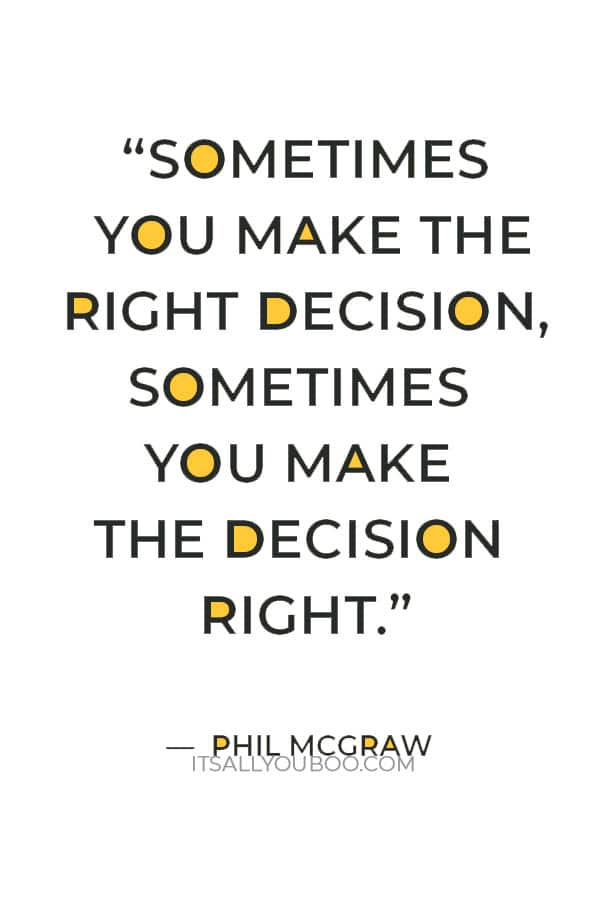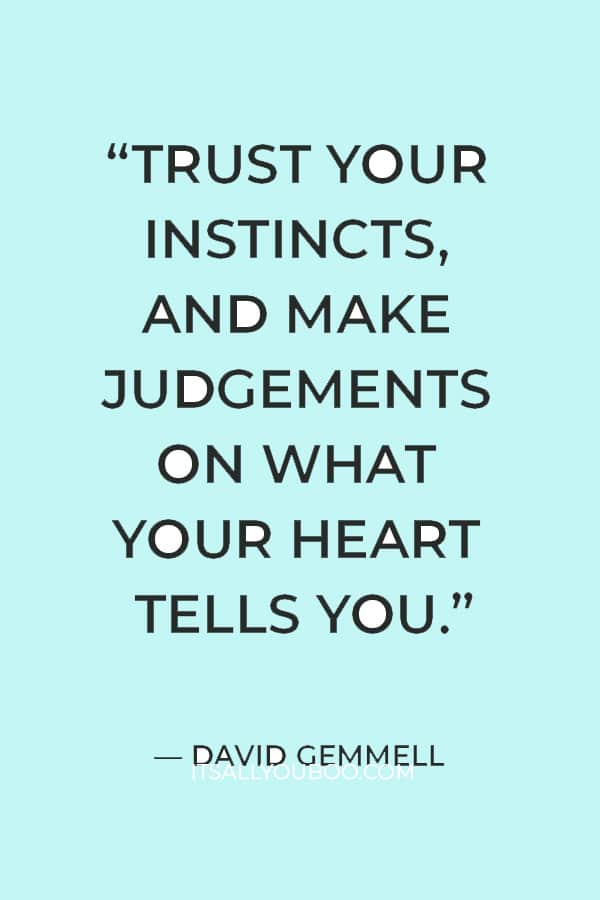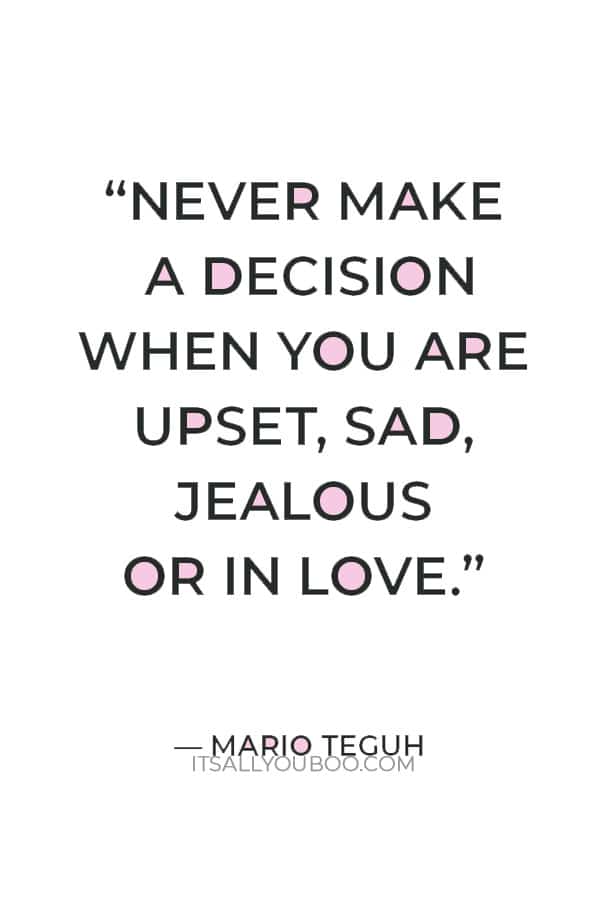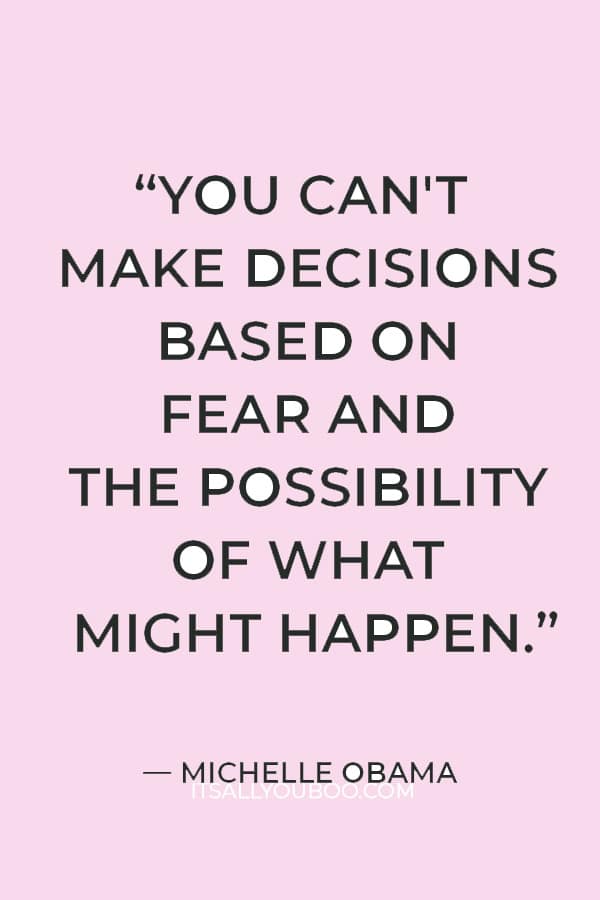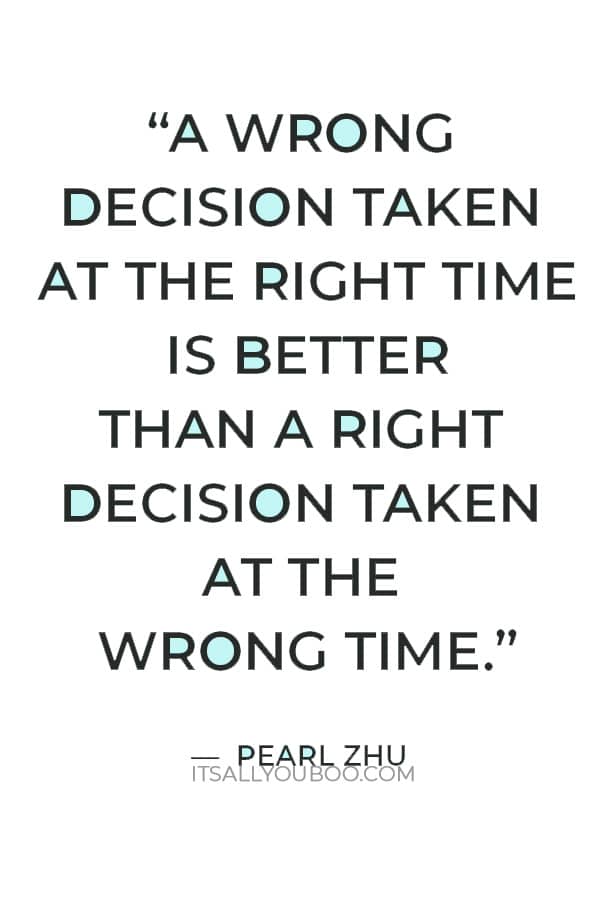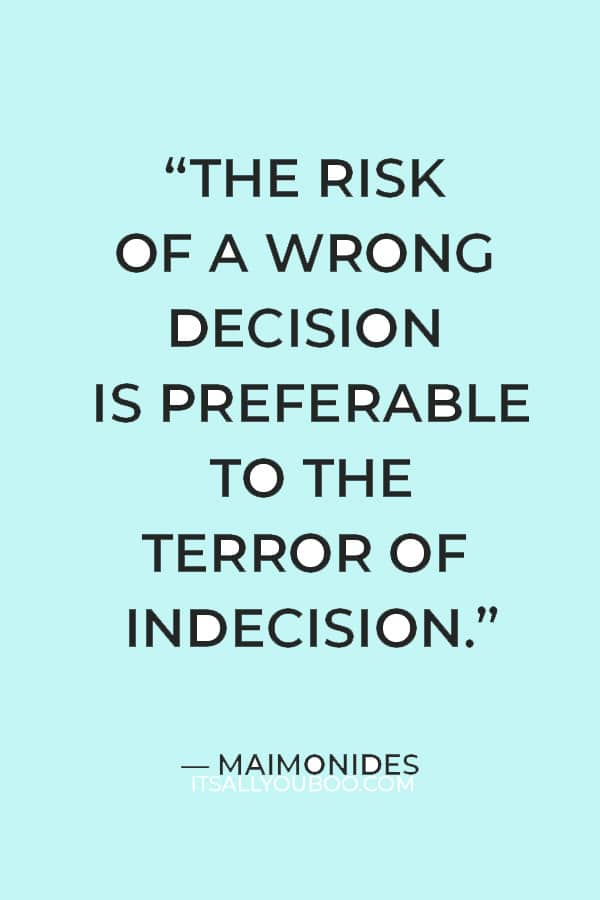Do you always wonder how to make decisions in life?
Or how to make decisions and not regret them later?
We make 35,000 decisions each day according to various estimates, and most of those are unconscious. We don’t even realize we’re making them. But some choices are life-altering; which values to uphold, what life purpose to pursue, where to take your relationship as a couple.
In no small measure, the quality of your decisions determines the quality of your life.
Yet I’d bet you never received formal training in ways to make a decision. If you’re like me, you learned how to make decisions in life the hard way: by suffering the painful consequences of our worst mistakes.
Years ago, I made a terrible judgment call. I was drinking heavily at a tailgate and you guessed it – I got behind the wheel. What happened next was a blur: flashing lights, a breathalyzer, and way-too-tight handcuffs. Thankfully, I didn’t harm anyone but myself, but the DUI was a crushing setback. I could have walked or hailed a ride, but impatience and carelessness got the best of me.
Later in my twenties, I almost got engaged to the wrong person because I ignored many red flags. To make a tough breakup worse, they then tried to steal money and valuables from me. It took a long time to recover and start trusting people again.
No doubt, not knowing how to make decisions in life will inevitably waste your time and exhaust your emotions. Ignorance is not bliss – it causes needless headaches and heartaches. Sure, sometimes it’s best to learn things the ‘hard way’. But the most successful among us first learn from others if they can. Moreover, they follow a proven system to make the best possible choices.
THIS POST MAY CONTAIN AFFILIATE LINKS.
IF YOU MAKE A PURCHASE FROM THESE LINKS, I MAY EARN A SMALL COMMISSION.
CLICK HERE FOR MY FULL DISCLAIMER STATEMENT.
How To Make Right Decisions in Life
Without further ado, here are seven proven tips on how to make decisions in life faster – this is your blueprint for how to have no regrets.
#1. You Need to Know Your Values
If you asked for my advice on whether to start a business or quit your job and travel the world, I couldn’t give you an answer. First, I’d need to know your values. How do you prioritize your health, relationships, need for creativity, growth, and contribution? For some, their physical health is #1. For others, it’s their relationships.
- What is your minimum expectation in each vital area of your life?
- Are you willing to sacrifice one for another?
Your values are the most crucial filter on how to make decisions in life. Everyone has unique personal values, such as honesty or freedom. They can be anything if they’re consistent and virtuous.
So first, make a list of all your values, group them, and then rank them by importance. Once you know your values, you have the clarity of purpose to create your goals. Here is a simple system for Personal Development Goals that work.
With your goals set, you can then make the right choice for yourself.
👉🏽 RELATED POST: How to Write A Personal Mission Statement
#2. Make Fewer Decisions Each Day
A study from Princeton University found that justices were much more likely to grant parole before noon. The theory is that our energy levels affect our choices. I see this often in my own life.
I do my best writing and workouts in the mornings. My efforts are much worse at the end of a stressful workday. Before a consequential decision, ask if you’re in a rested and clear-headed state—Time your most significant decisions during these peak states.
Try to reduce the volume of decisions you make each day. Consider that Steve Jobs, Mark Zuckerberg, and Barack Obama have been known to wear only a couple of outfits. I meal prep a few days in advance and automate as much as possible (bills, investments, re-orders.) The less mental energy you spent on trivial decisions, the more you’ll have for major ones.
An important realization on how to make decisions in life is ceasing to maximize value for every decision. Your goal for how to make decisions in life should be satisfactory. Finally, like an athlete before a big race, “taper off” before a big decision. Try to avoid having to make any big decisions back-to-back.
👉🏽 RELATED POST: How to Declutter Your Mind
#3. Be Aware of Your Unconcious Biases
Several cognitive biases can reduce rationality. Know these subconscious influencing factors, so they don’t cloud your objectivity.
For example, unconscious bias can occur when making a judgment about others. We are unaware of these implicit stereotypes, but they influence our decisions. Confirmation bias is when we only seek information that confirms our predetermined perspective. It’s being in love with a solution from the start.
The Monte Carlo fallacy believes that a random event is more likely if similar ones have occurred. It’s when the roulette player bets on a number because it appeared more than others. Rosy retrospection is when we recall the past as being better than it was. When someone brings up the “good old days,” they may be neglecting the bad parts.
The point is: we all have cognitive biases, but by being aware of them, we limit their ability to cloud our judgment.
#4. Don’t Fall Into a Decision Trap
There’s plenty of decision traps lurking.
One is ‘overthinking it’ – assuming if the problem is hard, the solution must be complicated. Whenever possible, favor simplicity over complexity. In the same vein, I prefer speed over perfection, especially if there is a first-mover advantage. If failure isn’t fatal, it’s better to fail fast, so you gain the feedback you need to succeed.
The mind tends to overcomplicate things, what to do when to call, how to say no. Ever spend an hour picking the ‘perfect’ show to watch, only to fall asleep during the opening credits? There so many situations where our minds fall victim to this analysis paralysis. That is, overanalyzing a situation to the point that no action occurs.
Sometimes no decision is better than a bad one, but I’ve found that to be the exception. Usually, inaction is the worst outcome. It leads to frustration and regret. Worst of all, it makes us feel disempowered. Unless the failure is fatal, take a chance. I’d rather fail fast and then pivot than spend my life projecting every possible outcome. It’s a much more interested and rewarding way to live.
Okay, enough philosophy. Another key point is don’t confuse relative value with absolute value. Let’s say you are buying a new car, and the salesperson quotes some enormous savings from MSRP. She is inflating the relative cost to sway your decision. But your concern should be whether the car is worth the discounted price to you (the absolute value).
Another trap is loss avoidance. This is when you focus on not losing something, resulting in missing a more significant gain. An example is not investing in stocks because they could lose value, though they are likely to appreciate eventually. Focus on the net profit instead of avoiding losses.
👉🏽 RELATED POST: How to Stop Overthinking Everything
#5. Cut Out The Noise from Your Choices
Ever seek out every piece of info available on the entire planet before deciding? Just unable to make decisions because you’re so indecisive?
This tendency is known as analysis paralysis. It’s when you get “derailed by details.” Sometimes it’s helpful to analyze the data and study the history of how to make decisions in life in the past. But once you hit diminishing returns, you’re stalling. Admit that you can’t know everything beforehand. So, don’t overanalyze every possible scenario; focus on a couple of likely outcomes.
Remove elements of the choice that are irrelevant or add noise. Set boundaries, limits, deal-breakers, and requirements that cull the options. If the fear of failure paralyzes you, remember that sometimes you don’t even need to go all-in. Often you can walk down a path to the point that it’s reversible.
If you haven’t taken the first step because you think you still “don’t know enough,” the 40-70 rule can help. Used by Colin Powell, this is the practice of deciding when you have at least 40% of the useful info.
#6. Use the WRAP System to Decide
Finally, let’s discuss a few quick tools for how to make decisions in life. There are tons of methods, so the critical question is: what is the simplest one for this use case?
Pros/Cons lists are popular, but it’s better to weigh each item by importance based on your values.
A helpful system goes by the pneumonic WRAP.
- Start by Widening your choices. That is, don’t settle for the options you’re given; push for new and better ones. See how you can expand your set of choices.
- Then, Reality-test your assumptions. Exit your head and reason some counter-arguments to your line of thinking.
- Next, Attain some distance before deciding. Step back and distance yourself from your emotions. Ask a caring friend or an impartial expert for advice.
- Finally, Prepare to be wrong. Think about what insurance or plan-b you have if things go south.
It’s a lot easier to make decisions you won’t regret after using WRAP.
#7. Try-On Six Hats
Another useful technique is called Six Hats. Pretend to put on each of the colored hats and act out its perspective.
- The white hat is the detective that scours all the evidence/data.
- The red Hat uses intuition and emotions. Tap into your gut and ask: what do I feel I should do?
- The black hat is the naysayer, the pessimist. Ask what could go wrong in the worst-case scenario?
- The yellow hat looks at things as an optimist. How would the most favorable outcome look?
- The green hat is the right-brained creative that imagines outside of the box.
- Finally, the blue hat sums up everything you’ve learned from the other five hats.
After tying on each hat, do you see how each perspective helps you make the decision in life?
👉🏽 RELATED POST: How to Start Believing in Yourself
Start Making Decision in Life Without Regret
Of course, there are many other decision methods. What’s most important is that you find one that works best for you and be consistent with it. If nothing else works, reflect on your values from earlier.
Which options align with your worldview? Which ones help you get to where you want to go in life?
Ask yourself: If I made this decision, how might it affect me in the future, whether it’s ten months or ten years from now? Most importantly, commit to your decision. If you go back and forth and waiver, you didn’t decide at all, and the burden is still there.
Get Your Right Choice Guide
Struggling to make your own decision in life? Get the tip sheet for making the right choice. This printable includes all ten ways to make the right choice in life.
Settle on a decision, be proud of your made one, and don’t ever have any regrets.
What advice on how to make decisions in life resonates the most with you? Have you had success with some (or all) of these techniques? Let us know in the comments!
How do you make decisions not regret them? Stressed about making the right choice? This is how to make decisions in life that you won't regret. #Indecision #Procrastination #Confidence #Overthinking
How do you make decisions in life that you won’t regret?

More About Guest Contributor
Chris is an accomplished sales and business development leader with experience at companies like Microsoft, Salesforce, and Dropbox. He went from being kicked out of high school twice to earning an MBA at UC Berkeley, and from being a pack-a-day smoker and aquaphobe to marathoner and triathlete. He writes about self-improvement for knowyourbest.com
Last Updated on July 11, 2021
